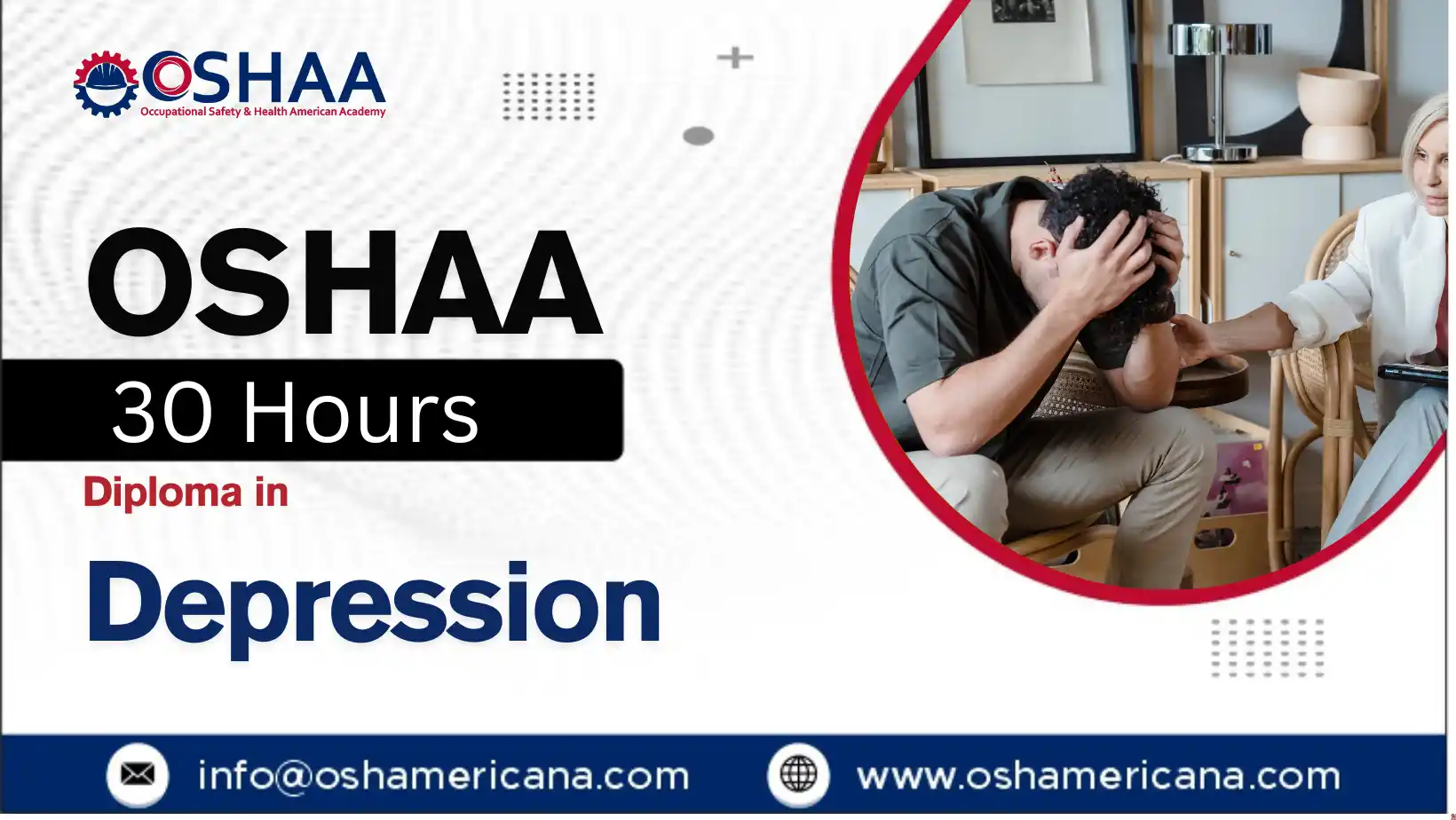Advance Your Knowledge with the Diploma in Depression Awareness
Depression is one of the most prevalent mental health conditions globally, affecting individuals across all age groups and backgrounds. With rising awareness of emotional well-being and psychological care, there is an increasing demand for mental health education that is accessible, practical, and evidence-informed. The OSHAA 30-Hours Diploma in Depression has been designed to provide participants with essential knowledge and understanding of depression, its causes, symptoms, treatment strategies, and the impact it has on individuals, families, and communities.
This diploma offers a professionally structured overview of depression, blending psychological theory with practical insight to help participants recognise, understand, and respond to depressive symptoms in a compassionate and informed manner. It covers a wide range of topics from biological and psychological causes of depression to therapeutic approaches, lifestyle factors, and support systems.
Spanning 30 hours of guided study, the course is built around contemporary psychological knowledge and best practices in mental health support. Participants will explore how depression presents across different age groups, identify risk factors and comorbidities, and evaluate various intervention strategies, including both medical and therapeutic options.
The OSHAA 30-Hours Diploma in Depression provides a practical and accessible pathway into mental health education. Developed by experienced professionals, the course content reflects current research and industry expectations. Participants benefit from a clear, structured learning journey that is grounded in compassion, professionalism, and a deep respect for those affected by mental illness.
The OSHAA 30-Hours Diploma in Depression is an essential step for participants seeking to build practical understanding, reduce stigma, and contribute meaningfully to the mental health and well-being of others.
OSHAA 30-Hours Diploma in Depression
Study Units
Learning Outcomes
Introduction to Depression and Mental Health Awareness (3 Hours)
- Define depression and its distinction from general low mood
- Understand the prevalence and social impact of depression
- Recognise the importance of mental health literacy and reducing stigma
Biological and Psychological Causes of Depression (4 Hours)
- Identify genetic, neurological, and hormonal contributors to depression
- Explain psychological models including cognitive-behavioural and psychodynamic theories
- Understand how environmental and social factors contribute to depressive disorders
Recognising Signs and Symptoms Across the Lifespan (5 Hours)
- Identify age-specific symptoms of depression in children, adolescents, adults, and older adults
- Understand how depression may present differently across genders and cultural backgrounds
- Recognise co-occurring disorders and their effect on depressive symptoms
Types of Depression: Clinical, Postnatal, Seasonal, and Atypical (6 Hours)
- Differentiate between major depressive disorder, persistent depressive disorder, and other forms
- Understand the unique features and triggers of postnatal depression and seasonal affective disorder
- Identify symptoms specific to atypical depression and treatment implications
Assessment Tools and Diagnostic Criteria (3 Hours)
- Explore key diagnostic frameworks such as DSM-5 and ICD-11
- Understand the use of common assessment tools such as PHQ-9 and GAD-7
- Learn to identify severity levels and referral thresholds for professional support
Evidence-Based Therapeutic Interventions (4 Hours)
- Understand the principles of cognitive behavioural therapy and other psychological approaches
- Explore the role of counselling, mindfulness, and interpersonal therapy in treatment
- Identify factors that influence therapeutic outcomes and client engagement
Pharmacological Treatments and Medication Management (3 Hours)
- Learn the main classes of antidepressants and their mechanisms of action
- Understand common side effects, risks, and the importance of medication adherence
- Recognise the role of healthcare professionals in prescribing and monitoring medication
Lifestyle Factors: Diet, Exercise, and Sleep in Mental Health (2 Hours)
- Understand how nutrition, physical activity, and sleep affect mood and mental well-being
- Explore evidence supporting lifestyle interventions in managing depression
- Learn to support individuals in making realistic and sustainable lifestyle changes
Course Benefits – OSHAA 30-Hours Diploma in Depression
The OSHAA 30-Hours Diploma in Depression is a comprehensive programme designed to deepen understanding of one of the most widespread mental health conditions. It equips participants with the knowledge, awareness, and practical insight needed to identify, support, and respond to depression in both personal and professional contexts.
Comprehensive Understanding of Depression
Participants gain a clear and structured overview of the biological, psychological, and social factors that contribute to depression, along with a deepened awareness of how it presents across the lifespan.
Early Identification and Intervention Skills
The course helps participants recognise the early warning signs and varying symptoms of depression, enabling them to respond sensitively and supportively in both informal and professional roles.
Enhanced Support Capabilities
Participants are equipped with strategies to offer empathetic, informed support to individuals experiencing depression, including basic intervention techniques and appropriate referral practices.
Improved Knowledge of Therapeutic and Medical Approaches
The diploma provides essential knowledge of evidence-based psychological therapies and pharmacological treatments, helping participants understand how treatment plans are developed and monitored.
Practical Application in Real-World Settings
Whether in healthcare, education, social care, or community environments, participants can apply their learning directly to support individuals experiencing low mood, isolation, or more severe forms of depression.
Promotion of Well-being and Stigma Reduction
Participants are empowered to foster open conversations around mental health, reduce stigma, and advocate for a more compassionate and inclusive approach to mental well-being.
Valuable for Career Progression
The course enhances professional development and is particularly valuable for those working or planning to work in roles involving care, counselling, teaching, human services, or mental health support.
Foundation for Advanced Study
For those considering further education in psychology, mental health, or social care, the diploma provides a strong academic and practical foundation to build upon.
Support for Personal Insight and Growth
Participants also benefit on a personal level by gaining tools to better understand their own mental health or support friends, family, and colleagues experiencing depressive symptoms.
This diploma offers not only professional value but also contributes meaningfully to wider societal awareness and mental health literacy.
The OSHAA 30-Hours Diploma in Depression is designed for participants who wish to gain a thorough understanding of depression and its impact on individuals, families, and communities. It is ideal for those seeking to build confidence in recognising, supporting, and responding to depression in both personal and professional settings.
This course is suitable for:
- Participants working in healthcare, mental health, social care, or community support roles
- Individuals pursuing careers in counselling, psychology, or therapeutic services
- Educational professionals seeking to better support pupils and families affected by emotional distress
- Support workers, carers, and volunteers engaging with vulnerable or at-risk individuals
- Human resource professionals and managers aiming to improve mental health support in the workplace
- Participants wishing to deepen their own understanding of depression for personal insight or family care
- Anyone planning to progress to further qualifications in mental health or emotional well-being
No prior qualifications in mental health are required. The course is accessible to a wide range of participants who are motivated to learn and act responsibly and compassionately in supporting those affected by depression.







